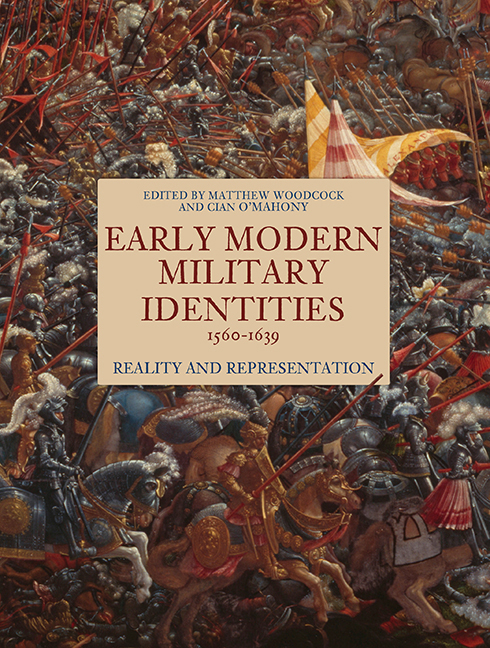Book contents
- Frontmatter
- Contents
- List of Illustrations
- List of Contributors
- Acknowledgments
- List of Abbreviations
- Introduction
- Part I Models of Military Identity
- 1 ‘Warlike prowesse and manly courage’: Martial Conduct and Masculine Identity in Late Tudor and Early Stuart England
- 2 ‘The Breviarie of Soldiers’: Julius Caesar's Commentaries and the Fashioning of Early Modern Military Identity
- 3 ‘Souldiers, or Clarkes, or both’: Ralph Knevet and the Fashioning of Military Identity through Print and Performance in Caroline Norwich
- 4 Thomas, First Lord Fairfax and ‘The Highway to Heidelberg’
- Part II Military Identities in Early odern Ireland
- Part III Staging Military Identities
- Afterword: The Way Ahead
- Bibliography
- Index
4 - Thomas, First Lord Fairfax and ‘The Highway to Heidelberg’
from Part I - Models of Military Identity
Published online by Cambridge University Press: 14 September 2019
- Frontmatter
- Contents
- List of Illustrations
- List of Contributors
- Acknowledgments
- List of Abbreviations
- Introduction
- Part I Models of Military Identity
- 1 ‘Warlike prowesse and manly courage’: Martial Conduct and Masculine Identity in Late Tudor and Early Stuart England
- 2 ‘The Breviarie of Soldiers’: Julius Caesar's Commentaries and the Fashioning of Early Modern Military Identity
- 3 ‘Souldiers, or Clarkes, or both’: Ralph Knevet and the Fashioning of Military Identity through Print and Performance in Caroline Norwich
- 4 Thomas, First Lord Fairfax and ‘The Highway to Heidelberg’
- Part II Military Identities in Early odern Ireland
- Part III Staging Military Identities
- Afterword: The Way Ahead
- Bibliography
- Index
Summary
The writings of the celebrated parliamentarian general, Thomas, third Lord Fairfax (1612–71), which include Psalm translations, poems, epigrams, a translation of Vegetius, and a treatise on horse-breeding, have come under belated scrutiny in recent years. Nearly all of these works are attributed to the period after Fairfax's retirement as commander-in-chief of parliamentarian forces in June 1650, and further contextualize the earlier literary accomplishments of the Fairfax family, such as the lavishly praised translation of Tasso's Gerusalemme Liberata by Thomas's great uncle, Edward Fairfax (1580?–1635). Yet hitherto, scant scholarly discussion has taken place on a substantial unpublished work by the first Baron Fairfax, Thomas (1560–1640), grandfather to the general. This Fairfax served in Queen Elizabeth's reign as a soldier in the Low Countries and on diplomatic missions to the future James I. He reputedly ruled his Yorkshire estate, and oversaw his grandson's upbringing, with military precision. Two of his sons were killed defending the Palatinate in 1621. ‘The Highway to Heidelberg’, a 15,000-word manuscript treatise written in the mid-1620s, was the literary undertaking into which his resulting grief was channelled. Principally, it argues the ways and means for the European Protestant powers to attack a recrudescent expansionist Spain in America, but it is also vitally concerned with family military identity: with cementing the Fairfaxes’ reputation as one of the most notable godly military families in England. In this chapter I explore the religious, political and literary-historical context of ‘The Highway’, its relationship to the military conflict from which its title derives, and the martial tropes of honour with which it is infused. I show that although the treatise is influenced by the local and the familial, its scope is self-consciously ambitious. In places it resembles the early modern military memoir in eschewing autobiography. It does so, however, not simply for stylistic reasons, but to more convincingly inform contemporary debate on geopolitical decision-making.
The version of ‘The Highway to Heidelberg’ held by the British Library is a forty-eight-page folio autograph manuscript complete with a title page, and bearing Fairfax's signature. Given its minimal number of insertions and revisions, it is almost certainly the original copy.
- Type
- Chapter
- Information
- Early Modern Military Identities, 1560–1639Reality and Representation, pp. 100 - 118Publisher: Boydell & BrewerPrint publication year: 2019



